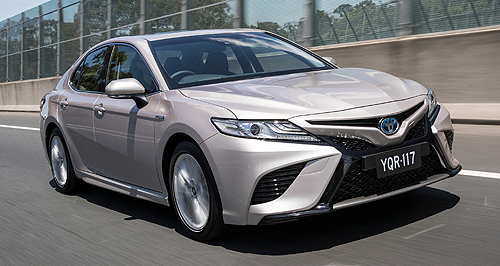News - ToyotaToyota pushing for hybrid sales boostPrime example: Toyota Australia has not ruled out introducing the Prius Prime plug-in hybrid in the future, but it is not on the radar at the moment. Plans to lift Toyota’s hybrid sales from five per cent in the next eight years24 Nov 2017 TOYOTA Australia has committed to increasing its hybrid offerings to eight models by 2020 as the company pushes to boost the sales mix of hybrid variants beyond five per cent of its total volume in the coming years. The Japanese car-maker first offered a hybrid model in Australia 16 years ago with the then revolutionary Prius small sedan, and has expanded the number of petrol-electric models and variants since to include the Prius C and V, and the Camry and Corolla hybrids. Speaking with Australian journalists at the Japanese-sourced new-generation Camry launch this week, Toyota Australia senior divisional manager of sales and marketing Sean Hanley confirmed the increased hybrid model and variant line-up. “By 2020 we will have eight hybrid models in Australia, and more are coming,” he said. While he would not reveal what the additional models would be, it is likely to include hybrid version of the C-HR crossover available in overseas markets. The wider hybrid line-up could also include a petrol-electric version of the Kluger large SUV, which is already offered in the US under its Highlander moniker, as well as a hybrid variant of the next-generation RAV4 that is expected in about 2020. The new models will join the existing Prius range, Camry hybrid and expected next-gen Corolla hybrid. Mr Hanley refused to comment when asked if one of the eight hybrid models could include a sportscar following the reveal at this year’s Tokyo motor show of Toyota’s GR HV hybrid coupe concept. Although many manufacturers are shifting to plug-in hybrid technology, Toyota does not currently offer a plug-in model in Australia despite the availability in other markets of the Prius Prime. Mr Hanley said the Prius Prime was not on the radar at the moment, but did not rule it out of contention completely. “It is not out of the question going forward but I think the Australian market still wants convenience. And plug-in is just one other alternate solution. It is available (Prius Prime) and for Toyota we can get it in the future. It is not like it is off the radar for us.” Mr Hanley said he was “not 100 per cent certain that Australians want to plug in cars” and suggested that buyers preferred the convenience of a regular hybrid. He added that Toyota Australia was committed to the all of the Prius models, including the Prius small hatch, Prius C and Prius V MPV despite the latter recently being pulled from the US market and its sluggish sales Down Under. “Yes we are committed to the Prius nameplate. Obviously market demand and segmentation will determine the future but we are committed to the Prius brand.” Just 242 Prius’ have found homes in Australia to the end of October this year, a 27.8 per cent drop over the same period in 2016. This figure makes it the slowest selling Toyota model available in Australia. The fourth-generation version launched in March last year. The older Prius V MPV has recorded 334 registrations, an 18.7 per cent drop, while the Prius C light hatch is the most popular Prius pick with 628 sales so far this year, a drop of 18 per cent. Hybrid models make up just five per cent of Toyota’s Australian sales, but Mr Hanley said it was the company’s goal to “significantly increase from five per cent up in the future over the next eight years”. He added that in the Camry range, 20 per cent of the outgoing Australian-built sedan’s sales were made up of hybrid variants, but the aim was for this to increase as well. “Clearly our target is that the hybrid will become the hero vehicle in the Camry range going forward.” When asked if further electrification made sense in Toyota’s future light-commercial vehicle line-up, a move that a number of other manufacturers are making globally, Mr Hanley said the company was open to all forms of alternative powertrain technology. “I think our direction is pretty clear. Hydrogen fuel-cell, hybrids, plug-in hybrids, full electrification. We will look at all sources. The great thing for Australia is we are developing these different powertrains around the world – Toyota is developing them for Europe, for Japan, for the US for China. We will, in a right-hand-drive sense, have a good menu of product to select from. Which won’t be one form or another, it could be a number of forms. “It is depending largely too on CO2 regulation in Australia, which we are not aware of right now but it is fair to say it is coming.”  Read more21st of November 2017  Driven: Toyota confident Camry will stay number oneNew-gen Toyota Camry gets more spec, new powertrains and similar pricing6th of October 2017  Tokyo show: Toyota shocks with GR HV Sports ConceptGR HV Sports Concept revealed ahead of Tokyo, but next Toyota Supra looms large13th of September 2017  Frankfurt show: Toyota amps up C-HR conceptToyota performance hybrid future is go with C-HR Hy-Power Concept17th of August 2017  Toyota updates Prius C hybrid hatchLight styling tweaks and equipment upgrades underscore Toyota Prius C refresh24th of March 2016  New York show: Toyota Primes PriusPrius in its prime with the return of a plug-in Toyota |
Click to shareToyota articlesResearch Toyota Motor industry news |
















Facebook Twitter Instagram